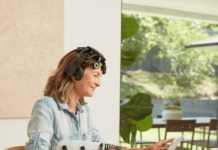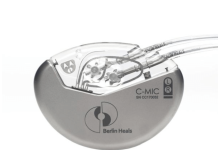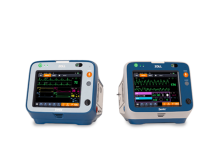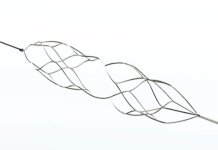Neural Sleeve™ First Algorithm-Powered Bionic Garment Designed to Help Those with Mobility Issues due to Multiple Sclerosis, Stroke, Cerebral Palsy, and Other Conditions, Regain Functional Movement in Everyday Activities – In-Market Later This Year
Cionic, a company committed to improving the lives of people with mobility differences by helping them move more independently through bionic clothing, is proud to announce that its first product offering, the lightweight leg-worn Cionic Neural Sleeve™, has been granted FDA clearance for “functional electrical stimulation to assist in gait for people with foot drop and leg muscle weakness.” This FDA clearance allows Cionic to take their Neural Sleeve to market and begin actively helping people with mobility issues due to Multiple Sclerosis (MS), stroke, Cerebral Palsy (CP), and other neurological conditions. Ushering in a new age of wearable technology, the Cionic Neural Sleeve is the first product to combine movement analysis and augmentation into a wearable garment.

THE CIONIC NEURAL SLEEVE™
“Wearing the Neural Sleeve, I move in a way that is more flowing and natural. I am walking more quickly and smoothly, while using less energy in doing so. Already I feel that I am getting stronger and more endurant”
“We are incredibly excited for the Cionic Neural Sleeve to be an FDA cleared Class II medical device and are ready to start impacting the lives of individuals with movement challenges in meaningful ways,” said Jeremiah Robison, Founder and CEO of Cionic. “Our mission is to become the new standard of care by addressing the underlying brain body connections, enabling confident movement, and greater engagement in the community.”
The lightweight and durable Neural Sleeve is designed to help people walk, a fundamental activity key to independent living, however, Cionic has built their platform from the ground up to enable solutions across the mobility spectrum. Cionic completed human factors and efficacy testing and submitted the Neural Sleeve for FDA clearance in November 2021.
“This would not have been possible without the more than 70 individuals across multiple sclerosis, stroke, cerebral palsy, and spinal cord injury who participated in our trials. Together with our research partners at Cleveland State University we were able to demonstrate statistically significant improvement to foot clearance, leading to more stable and confident walking,” continued Robison.
Jim Vecchi, who has been participating in Cionic’s MS trials, describes his experience with the Neural Sleeve.
“Wearing the Neural Sleeve, I move in a way that is more flowing and natural. I am walking more quickly and smoothly, while using less energy in doing so. Already I feel that I am getting stronger and more endurant,” said Jim Vecchi, trial patient. “I should also mention that the Neural Sleeve is surprisingly comfortable and my body has become accustomed to wearing it surprisingly quickly. I do not have the words to properly explain the positive effects on my confidence and outlook. I very much look forward to seeing what progress I can make with the help of the Neural Sleeve.”
Individuals interested in pre-ordering the Neural Sleeve may join our Founder’s Program starting now at www.cionic.com for delivery later this year.
Cionic was founded in 2018 by tech innovator Jeremiah Robison, who was motivated by his daughter’s mobility journey after her CP diagnosis. The company is on a mission to help all individuals with neurological disorders and injuries move without limits. For general mobility impairment, the current standard of care is quite basic – orthoses, walkers, wheelchairs – durable medical equipment that has been around for almost a century. Other treatments include pharmaceuticals, surgical procedures, and physical therapy.
HOW IT WORKS
The Cionic Neural Sleeve analyzes, predicts, and augments a person’s movement. Using advanced algorithms, the system reads the signal sent from the brain to the muscles and can predict a person’s movement 1/10th of a second before their foot lifts off the ground. The Neural Sleeve uses a dense array of sensors to measure how the body is positioned and how individual muscles fire during movement, predicts intended movement by measuring the electrical signal from the brain, and then algorithms analyze this data in real time to determine optimal muscle activation patterns. Cionic delivers Functional Electrical Stimulation to sequence proper muscle firing for natural movement. It is an adaptive system that provides real-time augmentation and adjustment of the participant’s movement, providing necessary assistance based on what can be measured of the participant’s neurological feedback that adjusts stimulation based on measured gait kinematics to optimize performance.
HOW IT LOOKS
The company’s discreet bionic clothing is designed and engineered to assist people with mobility challenges. Constructed with soft, flexible fabric fitted to an individual’s leg, the Neural Sleeve will be available in a variety of colors to match your personal style. The company is the first to combine movement analysis and augmentation into a wearable — the Sleeve’s sleek, mobile design makes it easy to integrate into everyday life, helping people move more independently.
ABOUT CIONIC
Cionic is a bold company committed to changing the lives of people with mobility differences by helping them move more independently. Motivated by his daughter’s journey with cerebral palsy, tech innovator Jeremiah Robison founded Cionic in 2018. Cionic builds bionic clothing that can analyze and augment human movement, enabling the body to move with more freedom and control than with crutches, walkers, or wheelchairs. Cionic thoughtfully combines the diagnostic power of a gait lab with the therapeutic power of Functional Electrical Stimulation (FES) into a lightweight, durable (and stylish) garment that can be worn anywhere and work everywhere. Cionic endeavors to exceed the expectations of human capability and change the lives of people with mobility differences and the lives of their loved ones by helping them move with greater confidence and independence. We’re currently working with academic partners around the world and conducting trials for people whose mobility is limited by neurological injuries such as cerebral palsy, multiple sclerosis, and stroke, with a goal to scale this solution to help anyone living with a mobility difference.




